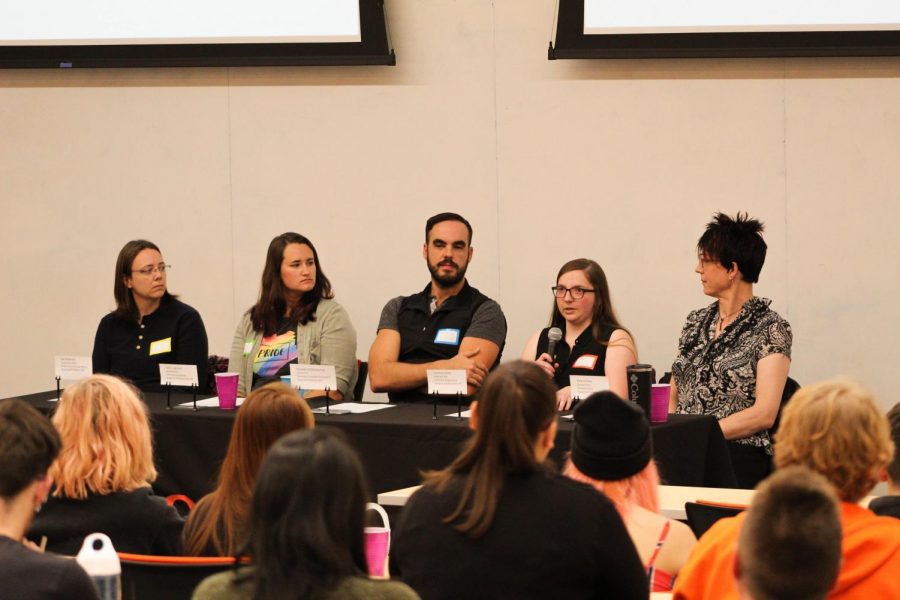Student-led LGBTQIA+ organization hosts STEM coming-out panel during Queer History Month
October 14, 2019
Corrections: This article has been updated to correct quotes by Kate Schilke, as well as a misspelling of her name, and correct the date she came out. The Barometer regrets these errors.
Out in Science, Technology, Engineering and Mathematics, a student-led pride organization, hosted a coming out panel for STEM departments on Friday in Johnson Hall. Conversations revolved around authenticity and safety in a workplace they perceive as traditionally dominated by straight and cisgender individuals, meaning a person whose sense of personal identity and gender corresponds with their birth sex.
Panel members discussed their thoughts on the importance of understanding where people with different identities come from and how it can lead to the elimination of bias and prejudice in the workplace. They hoped to spark thoughtful conversations and be inspiring role models in their community.
OSTEM hosts multiple events, like the coming-out panel, each year in hopes of bringing awareness to intersecting identities in the workplace. The panel consisted of three OSU professors and two Hewlett-Packard employees who all identify as part of the LGBTQIA+ community and work in STEM.
Elizabeth De Haven, a second-year forestry engineering major, believes panels like this are great starting points to important conversations. De Haven identifies as bisexual and has worried in the past about her identity getting in the way of her finishing her degree.
“There’s always been a constant fear that my family would disown me and I wouldn’t be capable of finishing my degree because I’m bisexual,” De Haven said via email. “My own ‘not being out’ is the hardest part of my identity for me, and it would make it so I couldn’t achieve my dream. So far, my family not knowing I’m in the LGBT community has been a very surprising obstacle on my way to becoming a forestry engineer.”
De Haven recalls hearing about people important to the STEM community being undermined in their field due to their LGBTQIA+ identities.
“Being forgotten because of something like who you love is a wild misjustice to many people in the STEM community and it’s what bothers me the most,” De Haven said via email.
OSU professors Eduardo Cotilla-Sanchez, Kate Schilke and Seri Robinson spoke at the panel regarding being open about their identities to their colleagues at the university and in research.
“I try to be very authentic about who I am. That’s very important to model for students,” Schilke said. “If you’re willing to be open, hopefully people will be willing to talk with you about it.”
Schilke is a bioengineering professor at OSU and identifies as bisexual and transgender. She said she came out to the entire College of Engineering in July 2017 by sending out a mass email stating she was going to be changing her name and other parts of her identity, which was met with numerous supportive responses throughout the department.
Seri Robinson, associate professor in the Department of Wood Science & Engineering, wants to advise students that, “just existing and being out is enough.” Robinson is intersex and uses they/them pronouns. They say they receive more confusion than aggression in the workplace, especially when their voice suddenly drops.
“I’ve always found the queer community to be very accepting,” Robinson said. “However, I see intersex as more of a medical condition, at least in my case, than I see it as a queer identity, but having to discuss being intersex is, quite frankly, exhausting.”
Eduardo Cotilla-Sanchez, an electrical and computer engineering associate professor at OSU, says he loves using his job to be a mentor for students who may be needing one. Cotilla-Sanchez identifies as gay and says he wishes he had had someone to look up to while completing his degree. Cotilla-Sanchez advises that those going into the workforce should invest their time in important decisions like deciding who to vote for and support.
Lorena Colcer and Taylor Johnson, both employees at HP, spoke at the panel as well. Johnson identifies as lesbian and works for research and development, along with being a co-chair for the pride interest group at HP. Colcer identifies as lesbian and works for product development at HP.
“I came out when I moved to Oregon, so it was like a clean slate. It was much easier to come out here than to people back home in South Carolina,” Johnson said. “Something I wish I would have known before coming out was the feeling you get in your stomach as it’s happening. I had had a long time to think about it and it wasn’t a spontaneous decision, but it was still terrifying.”
Johnson said she would like to tell students “you don’t always have to be ‘on.’ Sometimes you’re just too tired and you don’t owe it to anybody.”
When Colcer was a student at OSU, she had Schilke as a professor for multiple classes.
“I had them as a professor as both a man and a woman while I was at OSU,” Colcer said. “I went to their office hours when they were a man and he came out to me as bisexual when I mentioned a girlfriend of mine. I never told a soul and it made me feel so special, and I felt braver for future conversations after that.”
Colcer said her parents were raised to not be supportive of people in the LGBTQIA+ community, but have since changed their views a lot.
“I strongly believe in patience. They’ve grown a lot the past few years and I’m really proud of them,” Colcer said.
Schilke ended the panel by noting that people are too used to putting others into rigid categories that may not fit everyone, but it is important to make it clear how you want others to see you.
“Never forget that the ‘pride’ part is your courage of being able to accept yourself and the courage to ask others to accept you,” Schilke said.










































































































